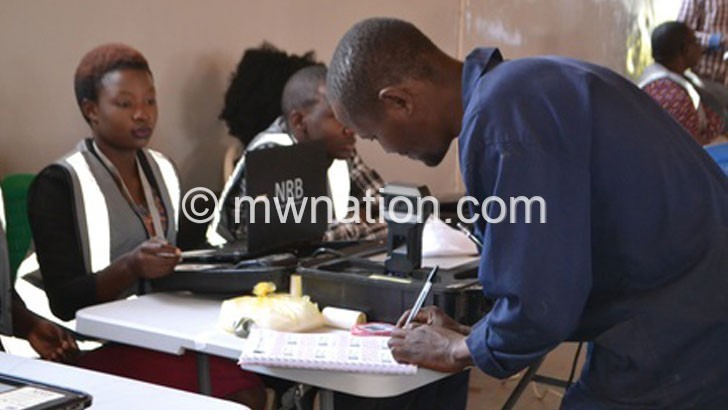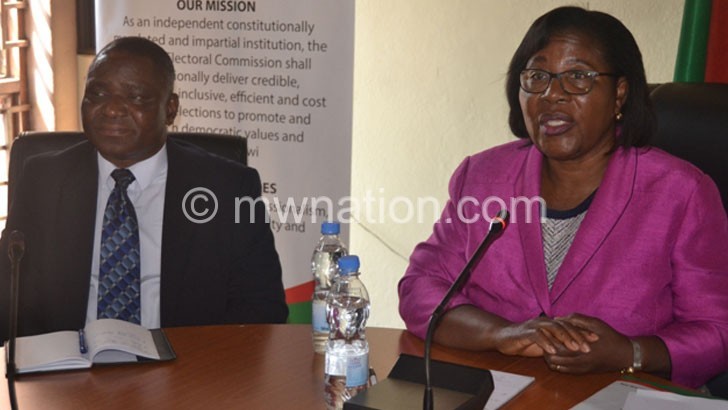Voter apathy trends:Why?
Political parties and commentators have given varying reasons for the dwindling voter turnout trends in the country’s national elections from a record 93 percent in the 1999 General Elections.
While political analysts attribute the trend to waning excitement among voters after the country adopted plural politics in 1993, some political parties, notably those in opposition, have blamed the situation on failure by governing parties to deliver on their promises.

Statistics show that during the first post-independence multiparty general elections in 1994, there was an 80 percent voter turn-out which swelled to 93 percent in 1999 only to shrink to 59 percent in 2004.
Malawi Electoral Commission (MEC) statistics show that voter turn-out improved to 78.2 percent in 2009 before slowing down to 70.7 percent in the 2014 Tripartite Elections.
With the May 21 2019 Tripartite Elections barely six months away, MEC has reported a 664 521 drop in registration figures from 7.5 million in the 2014 elections.

The development comes against the background of findings of a survey by the Zomba-based Institute of Public Opinion and Research (Ipor) that people have lost confidence in politicians.
The Ipor findings echoed a 2006 Voter Apathy in Malawi: A Critical Appraisal by associate professor Blessings Chinsinga of the University of Malawi’s Chancellor College which concluded that voters were more likely to turn out in large numbers if they generally perceive the entire electoral process as being fairly competitive.
Given these trends, do political parties have reason to get worried? Who is to blame for the apathy?
Mustapha Hussein, a political commentator based at Chancellor College, acknowledged that voter apathy appears to be creeping in. He said many people shun participation in democracy through voting because they feel they do not benefit from casting their votes.
He observed that the excitement to vote in the first two post-independence general elections died after casting their votes.
But People’s Party (PP) spokesperson Ackson Kalaile Banda shared the position that the dwindling turn-out indicated loss of trust by the electorate in the governing party.
In a separate interview, Malawi Congress Party (MCP) said the low turnout—both in recent elections and voter registration—reflected a loss of trust in politicians, especially those that have governed the country since the dawn of plural politics.
He said: “Since the transition from the one-party era, we have not had leaders that have delivered to people’s expectations. People want real change and not someone who has a dented image. That is why people may have lost interest in politicians.”
However, United Democratic Front (UDF) spokesperson Ken Ndanga, whose party formed the first multiparty administration in 1994, said it is immature to rush into conclusions.
He brushed aside Ipor findings, saying there is proof that people might have lost trust in politicians.
On her part, UTM interim secretary general Patricia Kaliati said the electorate might have lost trust in politicians “but not the UTM as we are new and they [people] are interested in what we are promising them”.
Governing Democratic Progressive Party (DPP) spokesperson Nicholas Dausi said he needed more time to consult before responding.
But in a separate interview, Chancellor College political science lecturer Joseph Chunga said looking at the current projection, there was need for MEC to consider re-opening some centres.
He said: “For the sake of the credibility of the next government, it would be important to give people a chance to register, especially for all districts and centres with turnout of less than 80 percent.”
In another interview, Catholic Commission for Justice and Peace (CCJP) acting national coordinator Boniface Chibwana and Malawi Electoral Support Network (Mesn) chairperson Steve Duwa mentioned lack of a rigorous campaign to woo eligible voters to register as a contributing factor.
Chibwana said political parties, as key stakeholders, did not do enough.
MEC director of media and public relations Sangwani Mwafulirwa said the electoral body will provide a way forward in due course.





